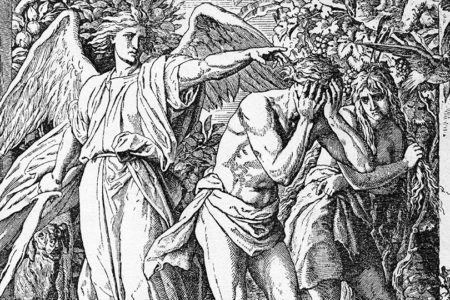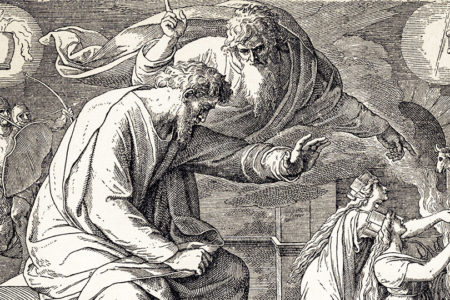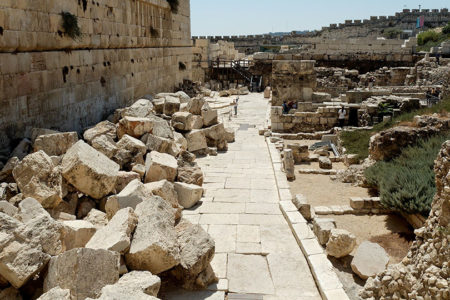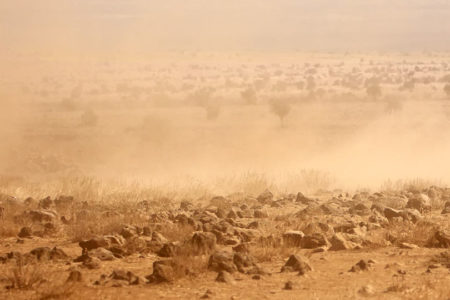The End of the Line Conclusion
Nothing thwarts the God of Israel. He alone is sovereign. He alone declares the end from the beginning “and from ancient times things that are not yet done, Saying, ‘my counsel shall stand, And I will do all my pleasure’” (Isa. 46:10).
He alone can “whistle” to call a bird of prey from the East and a man from a faraway country to execute His judgment: “Indeed I have spoken it; I will also bring it to pass. I have purposed it; I will also do it” (v. 11).
No one can outrun, outsmart, outmaneuver, or outshine Him. And though the world may appear utterly out of control, the reins of the universe securely rest, and always will, in the firm, wise, and merciful grip of Almighty God.
Around 841 B.C., the world must indeed have looked out of control to Jehoshabeath. The godly Davidic princess (also called Jehosheba) and her husband, the high priest, had seen a wave of bloodshed that had reduced the Messianic line of the southern kingdom of Judah to a meager few. But the worst was yet to come.
When Judah’s king, Ahaziah, Jehoshabeath’s youngest and only surviving brother, went to the northern kingdom of Samaria to visit his uncle, King Jehoram, he did not know that God had already dispatched Jehu to execute judgment on the abominable house of Ahab. Jehoram was Ahab and Jezebel’s son (2 Ki. 9:22). Unaware of Jehu’s intent, Jehoram and Ahaziah went to meet him in their chariots. Jehu killed Jehoram and had Ahaziah shot through with an arrow as he fled to megiddo, where he died (vv. 23–24, 27).
Next on Jehu’s list was Jezebel, easily the wickedest woman in the Bible.(Ahab’s daughter Athaliah, Ahaziah’s mother, ran a close second.) After Jezebel was killed, Jehu had Ahab’s 70 sons put to death, and he later obliterated the rest of Ahab’s line by killing “all who remained to Ahab in Samaria, till he had destroyed them, according to the word of the Lᴏʀᴅ which He spoke to Elijah [see 1 Kings 19:15–17]” (10:17; cf. 6, 11). He also killed the priests of Baal (vv. 18–28).
But between purges, Jehu happened on Ahaziah’s brethren from Judah (obviously cousins because his brothers were already dead, 2 Chr. 21:17). They had come to visit Jehoram and Jezebel (2 Ki. 10:13). Without hesitation, Jehu had all 42 men slaughtered (2 Ki. 10:14).
As a result, “the house of Ahaziah had no one to assume power over the kingdom” (2 Chr. 22:9).
With her uncles, brothers, and cousins all dead, Jehoshabeath knew the only direct heirs to the throne now resided in the nursery. Rarely have good and evil been so sharply and clearly defined. On the one hand was Queen mother Athaliah, as satanically driven as Adolf Hitler would later be. On the other hand was her godly stepdaughter, Jehoshabeath. The entire future of the Davidic Kingdom came down to the confrontation between these two women. One served the devil; the other, the omnipotent God of Israel.
The Bible says when Athaliah heard her son was dead, “she arose and destroyed all the royal heirs of the house of Judah” (v. 10). This evil daughter of Ahab killed her own grandchildren and seized the Davidic throne for herself. Wrote commentator William MacDonald, “The long-range consequences of what she tried to do are staggering. This was a satanic attempt to break the royal messianic line.”1
But Jehovah cannot be thwarted, and His promises cannot be broken. He promised to build a house for His servant David that would endure forever (2 Sam. 7:16), and He does what He says. In fact, the very woman He would use was named Jehoshabeath, meaning, “Jehovah is her oath”—a name “referring to some solemn promise of God.”2
So Jehoshabeath went to work. Having grown up in the palace, she knew her way around. Risking her own life, she nevertheless entered the palace and took Joash, the year-old son of Ahaziah, “and stole him away from among the king’s sons who were being murdered; and they hid him and his nurse in the bedroom, from Athaliah, so that he was not killed” (2 Ki. 11:2).
First she hid him and his nurse in what Bible scholar C. F. Keil called the “chamber of beds.” This room was not the nursery but rather “a room in the palace where the beds (mattresses and counterpanes) were kept, for which in the East there is a special room that is not used as a dwelling-room….This was the place in which at first it was easiest to conceal the child.”3
Second Kings 11:3 says the baby then “was hidden with her in the house of the Lᴏʀᴅ for six years, while Athaliah reigned over the land.”
Wrote Keil, “Afterwards he [Joash] was concealed with her (with Jehosheba) in the house of Jehovah, i.e., in the home of the high-priest in one of the buildings of the court of the temple.”4
Joash was the end of the line. Had he been killed, the Davidic Kingdom would have come to an end, and the Redeemer whom God had promised would never have been born. Like the Bible-believing Ten Boom family in Holland and like all the other “righteous Gentiles” who hid Jewish people from the satanically driven Nazis during World War II, Jehoshabeath was used of God to preserve life. The life she preserved was the end of the line: the sole remaining heir to David’s throne. For six years, Joash probably passed as one of her own children.5
Then, when Joash was seven years old, Jehoshabeath’s husband, Jehoiada the high priest, made elaborate and wise arrangements with the Levites, priests, and soldiers. Using King David’s spears and shields that had been stored in the Temple, hundreds of armed soldiers surrounded little Joash on all sides:
And they brought out the king’s son, put the crown on him, gave him the Testimony [Law of Moses], and made him king. Then Jehoiada and his sons anointed him, and said, “Long live the King!” (2 Chr. 23:11).
Athaliah was killed, and the kingdom was secured. Joash reigned 40 years in Jerusalem. “And Jehoiada took two wives for him and he had sons and daughters” (2 Chr. 24:3).
God is not a liar. Nor is He incapable of delivering what He has promised. In the contest between Athaliah and Jehoshabeath—Satan and God—Jehoshabeath won. No matter how hard Satan tries to rid the world of Jews, he will not succeed. God has promised that He will never cast off all the seed of Israel (Jer. 31:35–37), that He will give the land of canaan to the Jewish people as an everlasting possession (Gen. 17:8; Ps. 105:8, 11), and that messiah will reign on the throne of David:
Upon the throne of David and over His kingdom, To order it and establish it with judgment and justice From that time forward, even forever. The zeal of the Lord of hosts will perform this (Isa. 9:7).
Because of Jehoshabeath’s courage and faithfulness, the “end of the line” is Jesus.
ENDNOTES
- William MacDonald, Believer’s Bible Commentary (Nashville: Thomas Nelson, 1995), 404.
- Herbert Lockyer, All the Women of the Bible (Grand Rapids: Zondervan, n.d.), 72.
- C. F. Keil and F. Delitzsch, “The Second Book of Kings” in Commentary on the Old Testament in Ten Volumes (Grand Rapids: Eerdmans, n.d.), 3:356.
- Ibid.
- Alfred Edersheim, Bible History: Old Testament (1890; reprint, 7 vols. in 1, Peabody, MA: Hendrickson, 1995), 837.







